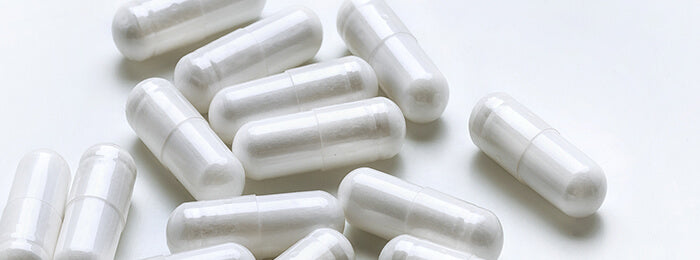With good gut health being at the forefront of medicine, would it be realistic to think of adding even more microorganisms to the gastrointestinal tract? The gastrointestinal tract is home to over 500 different bacterial species, containing over a trillion live organisms.1 These organisms influence not only our gut microbiota, but also other systems in the body.*2,3,4 The endogenous gut microbiota has antimicrobial and immune supporting benefits which support barrier function, IgG production, and aid in the synthesis of minerals and micronutrients*5,6 This highly structured system is ever-evolving and influenced by external factors, beginning with a person's method of birth, genetic factors, and overall health.7,8 When reaching adolescence, a constantly changing environment, circadian rhythm, food intake, and gut motility can all influence the microbiota.9,10,11,12
Defining Probiotics
As practitioners, one of the cornerstones of our education is that good health starts in the gut. Reestablishing gut health and reaching homeostasis in the microbiome can begin with dietary changes and a reduction in various environmental exposures. Until recently, high-dose probiotics were a relatively new term, with average supplement intervention of probiotics ranging from 1 billion to 50 billion. The effect of supplemental probiotics may vary depending on the delivery system, specific strains, and strain count. The use of probiotics with varying CFU counts has been shown to support the gastrointestinal tract as well as the immune system.*13,14 Is it possible that higher quantities may significantly alter environment at a rate that lower CFU count may not?*
It would make sense: the higher the dose, the larger the benefit, right?
A Closer Look at Colony-Forming Units (CFU)
Research has shown that probiotics, both high and low CFU count, influence the host and support in reducing occasional digestive symptoms.*14,15 The results of a double blind, placebo controlled, dose-ranging study showed greater benefits for those taking a higher CFU count capsule when compared to half the dose or placebo.16 With each capsule containing 50 billion CFU of lactobacillus, the group receiving two capsules had a superior reduction in symptoms when compared to the other two groups, highlighting the use of a higher count of 100 billion CFU.
A systematic review and meta-analysis of 14 randomized control trials evaluated the effect of probiotics on transit time. The general analysis of these multiple trials (a total of 1,182 participants) was that probiotics, at a dose ranging from less than 1 billion up to 17.2 billion CFU, improved stool frequency.*
However, study results assessing higher CFU probiotics suggest a different subset of benefits. A randomized controlled trial looked at the use of 450 billion CFU lyophilized bacteria or placebo for gastrointestinal health.18 The results showed no significant improvement in transit measurements or bowel function scores between the placebo and the control group; however, there was improvement in occasional abdominal bloating. Those receiving the daily probiotic did not see any change in other outcomes measured.
Intended Use and Delivery Method
Depending on the overall intent of the application, the length of administration for probiotics can vary. Choosing between either single strain or multi-strain formulas is also a decision which can influence the range of administration and outcomes. When using high-dose probiotics, it is common for them to be used as an adjunct therapy within a protocol. The majority of studies looking at high-dose probiotics range from a few days to 8-10 weeks in length, indicating higher CFU count is used on an acute, short-term basis.19,20 A patient evaluation, including a health history and lab work such as stool analysis, can be useful before starting a probiotic with a higher CFU count.*21
When deciding on the CFU count of probiotics, regardless of application, some of the most important attributes of a probiotic are dependent on the methods used to provide stability and survival within the digestive system. Some probiotic products are designed to endure harsh acidic environments, including gastric acid and bile, so that they may reach the appropriate endpoints.
REFERENCES
1. Gill SR et al. Science. 2006;312(5778):1355-9.
2. Bravo JA et al. Proc Natl Acad Sci U S A. 2011;108(38):16050-5.
3. Yoo J et al. Nutrients. 2016. 8:173.
4. Saulnier DM et al. Gut Microbes. January/February 2013. 4:1, 17-27.
5. Zeng MY et al. Immunity. 2016;44(3):647-658.
6. Scholz-Ahrens KE et al. J Nutr.. March 2007. 137. 3 Suppl. 2:838S-46S.
7. Grönlund MM et al. J Pediatr Gastroenterol Nutr. 1999;28(1):19-25.
8. Kolde R et al. Genome Med. 2018;10(1):6.
9. Leone V et al. Cell Host Microbe. 2015;17(5):681-9.
10. Chierico FD et al. International Journal of Molecular Sciences. 2014;15(7):11678-99.
11. David LA et al. Nature. 2013;505(7484):559-63.
12. Takeshita E et al. J Gastroenterol. 2006 Mar; 41(3):223-30.
13. Evrard B et al.PLoS One. 2011;6(4):e18735.
14. Kim JH et al.NeurogastroenterolMotil. 2005 Oct;17(5):687-96.
15. O’Mahony L et al. Gastroenterology. 2005 Mar;128(3):541-51.
16. Gao XW et al. Am J Gastroenterol. 2010 Jul;105(7):1636-41.
17. Dimidi E et al. Am J Clin Nutr. 2014 Oct;100(4):1075-84.
18. Kim HJ et al. Aliment PharmacolTher. 2003 Apr 1;17(7):895-904.
19. Dubey AP et al. J Clin Gastroenterol. Sep 2008;42 Suppl 3 Pt 1:S126-129.
20. Gionchetti P et al,. Dis Colon Rectum. Dec 2007;50(12):2075-2082; discussion 2082-2074.



